A Farewell to Shapiro
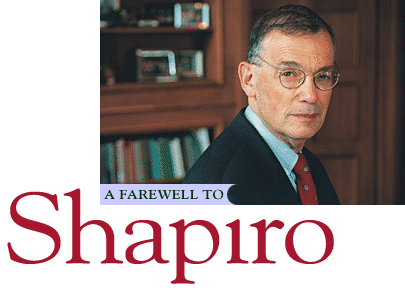
BY ANDREW MULLINS & DIANA GRIER AYTON
For someone who wasn't even sure he wanted the job, Bernard Shapiro leaves an impressive legacy. The scope of the work he has achieved as principal of McGill is broad. The reasoning behind it -- "that incandescent intelligence," as Secretary-General Victoria Lees puts it -- is prescient. Much of what he has set in motion in his eight years at McGill is just now gathering steam -- new buildings and academic programs, faculty renewal, invigorated research partnerships -- and will come to fruition after he is gone.
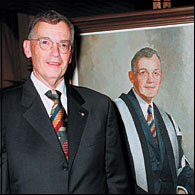 Shapiro at the
unveiling of his official portrait. Shapiro at the
unveiling of his official portrait.PHOTO: Claudio Calligaris |
|
|
|
|
Shapiro hands the job over to Heather Munroe-Blum, a former vice-principal at the University of Toronto, and a friend he has no doubt will be perfect for McGill. She'll be the beneficiary of many of the battles Shapiro has waged on behalf of the University -- he leaves it on a more solid footing than ever before.
"He's been a superb mentor," says Provost and Vice-Principal (Academic) Luc Vinet. "What he gave this university is inestimable."
"I think history will acknowledge him as one of the great academic leaders of both McGill and the country as a whole," says McGill Chancellor Dick Pound, BCom'62, BCL'67.
|
|
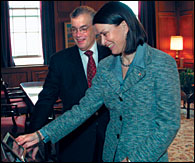 Shapiro with his
successor Heather Munroe-Blum. Shapiro with his
successor Heather Munroe-Blum.PHOTO: Owen Egan |
|
|
|
Before arriving in 1994, the Montreal-born Shapiro was a reluctant candidate for the top position at McGill. He was happy as a professor of education and public policy at the University of Toronto, where his wife, Phyllis, herself a professor of education, was also teaching. He saw little reason to pull up stakes and move to Montreal to head a university where he would confront head-on the morass that is Quebec politics, which at that point was heating up toward the 1995 referendum on sovereignty.
But the man who in 1956 had been the top student in McGill's Faculty of Arts was eventually convinced to return home. "I feel somehow it was meant that he lead McGill," said Chancellor Emerita Gretta Chambers, BA'47, DLitt'01, at a recent colloquium on the future of universities held in the principal's honour on campus. "He was a real reality check, and he got us to recognize our strengths and own up to our weaknesses."
Victoria Lees, PhD'77, who has herself just retired from McGill, concurs: "I think Bernard's greatest achievement is that he made us remove our rose-coloured glasses and assess ourselves honestly -- our academic programs, our finances, our position as an English-language university in a French milieu. He constantly reminded us that the University cannot be all things to all people, and that we had to make choices."
 PHOTO: Marcos
Townsend PHOTO: Marcos
Townsend
|
|
|
|
|
CHANGE, CONFLICT AND CONTROVERSY
Part of the Shapiro-style reality check was built on plain talk -- or as plain as possible for the cerebral, opera-loving scholar and education policy expert. His discourse is rooted more in the old school of rhetoric than the new school of sound bites, but he can also be blunt. This would occasionally cost him congeniality points in the minds of some, who longed perhaps for more sympathetic, glad-handing leadership, instead of the sometimes brutal truth that came with running a Quebec university in the budget-slashing 1990s.
It didn't take long for him to plunge headlong into controversy. In 1995, reacting to enormous university budget deficits and underfunding by the government, Shapiro tabled a document called "Towards a New McGill," positing solutions that included the possibility of tuition increases, reduced enrolment, reduced faculty and staff, and that raised the spectre of privatization. It was meant to shake things up, and it succeeded.
|
|
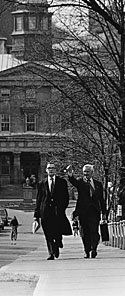 On campus with
predecessor David Johnston, LLD'00. On campus with
predecessor David Johnston, LLD'00.PHOTO: credit |
|
|
|
Similar issues resurfaced in a 1997 follow-up report from Shapiro called "Renewal at McGill." Reaction focused on the least likely of scenarios for McGill -- privatization -- and the howls of indignation were heard for miles. But these were wake-up calls for the University, and addressing the price tag of running McGill in light of funding inequities and soaring operating costs was a battle Shapiro led over his entire tenure: reducing the deficit to $8 million from $80 million, leading the call by Quebec universities for a reinvestment in education, and reiterating at every opportunity the need for tuition increases in a province where tuition was frozen at the lowest levels in Canada.
HELL NO, WE WON'T GO
The need to raise tuition fees -- still frozen today by a provincial government fearful of alienating the youth vote - -- is a message Shapiro continues to deliver regularly, though he is perfectly aware it makes him unpopular to some. At his final address to the Students' Society of McGill University (SSMU) he said that "it is willful ignorance and self-indulgence to think that something else is possible" in the ongoing political climate of cost-cutting. "Sometimes I think students regard universities the way music fans regard Napster," he noted playfully in a 2001 address to SSMU. "They don't much care about the musical artists, they just want their music for free."
In 1997, the conflict over the cost of education erupted into campus protest with the introduction of new administrative fees for students. Protesters burst in on the principal at his desk and proceeded to occupy his office for three days. Shapiro took it all in stride, saying at the time, "While I'm not interested in engaging in a public debate with people who are occupying my office, I do understand their concerns.... The problem is how we'll manage the giant drop in revenue imposed by the government. But their concerns are real and not unimportant."
That even-handed approach to hot-button issues is, for Tony Masi, Vice-Principal (Information Systems and Technology), part of the Shapiro style. "No one can lead a major research university such as McGill for more than eight years and not have to confront conflict, dispute, or events that are difficult to handle," says Masi when asked about the Principal's managing of campus brouhahas. "Rather than a specific situation, I remember Bernard's absolute insistence on principled action whatever the circumstance."
Dick Pound agrees. "The Principal is always putting out fires," says Pound, "and one of the great things about Bernard is that the fires tend to go out entirely and without too much smoke."
 With astronaut
Julie Payette, BEng'86 With astronaut
Julie Payette, BEng'86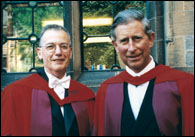 With Prince
Charles when both received honorary degrees from the University of
Glasgow in 2001. With Prince
Charles when both received honorary degrees from the University of
Glasgow in 2001.
|
|
|
|
|
BUILDING ON SUCCESS
There were many other issues of importance for Shapiro. He was keen on building more research and academic networks, both in Quebec and internationally. One of his first acts as principal was to visit all the other Quebec universities, whose administrators were so unaccustomed to such brazen action by a McGill principal that "it took half an hour to calm them down," jokes Shapiro. "The initial reaction was that it must be some kind of imperialistic venture, as if I was coming to announce 'McGill's going to establish a beachhead in your community and get out of the way.'"
Shapiro would eventually go on to serve a two-year term as head of the Conférence des Recteurs et des Principaux des Universités du Québec (CREPUQ), an association of Quebec senior university administrators that cultivates partnerships and collaboration and allows universities to work together in dealing with the government.
McGill's success as a research-intensive university has flourished under his leadership, particularly in winning funding from the Canada Foundation for Innovation (CFI) program sponsored by the federal government, and additional funding from the Canada Research Chairs program. There have been major overhauls as well to the curricula in several faculties, and new programs like software engineering and the innovative, multidisciplinary School of Environment.
Says Dean of Agricultural and Environmental Sciences Deborah Buszard, "Bernard has always been very receptive to our academic initiatives, beyond the traditional, and has been highly supportive of our Faculty's move into new teaching and research areas. With his support we've created new teaching programs in Environment and Biotechnology and implemented exciting CFI-funded research initiatives on the Macdonald Campus."
Indeed, the CFI results have been so good, Shapiro has had to tackle what he calls "the cost of success": finding the money to support the infrastructure and staff requirements for all the new projects. The basic University operating costs remain a big challenge as well. Overall, Shapiro says, "McGill needs an additional $80 million per year to operate at a properly funded level."
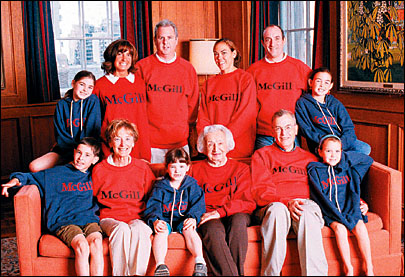
Bernard and Phyllis Shapiro with family members in full
McGill regalia on the occasion of their 45th wedding anniversary last
fall.
PHOTO: Nicolas Morin


